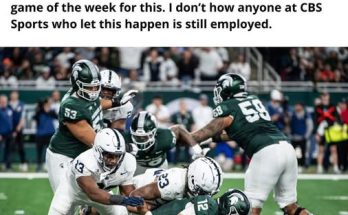Legal War Erupts in Baton Rouge! Brian Kelly Fights Back as LSU Claims He Was Never Formally Fired — $54 Million Buyout Now in Jeopardy! ⚖️
The storm that has been quietly brewing in Baton Rouge has finally exploded into a full-blown legal war that could send shockwaves throughout college football. Former LSU head coach Brian Kelly, who led the Tigers through three turbulent yet eventful seasons, is now locked in a bitter battle against his former employer — Louisiana State University. The heart of the conflict? A massive $54 million buyout that Kelly claims he is owed after what he calls his wrongful dismissal. LSU, however, insists there was never a formal termination, and therefore, no buyout is due. The clash between one of the most decorated coaches in college football and one of the most storied programs in the SEC has become a gripping saga of contracts, egos, and high-stakes legal maneuvering.
When LSU hired Brian Kelly in late 2021, it was one of the most expensive coaching deals in college football history. The former Notre Dame coach left South Bend for the SEC powerhouse under a contract worth nearly $100 million, including performance bonuses, retention incentives, and an eye-popping buyout clause that guaranteed him tens of millions even in the event of termination. At the time, Kelly’s arrival was heralded as the beginning of a new era for LSU football — a statement of intent that the Tigers were committed to reclaiming their place atop college football’s mountain.
But just a few years later, that dream has soured into a nightmare of legal filings and public accusations. LSU’s administration, under pressure from boosters and fans frustrated by uneven performances and off-field controversies, parted ways with Kelly after the 2024 season in what appeared to be a mutual separation. But Kelly’s camp insists that behind the scenes, things were anything but mutual. According to his attorneys, LSU’s handling of his departure was “procedurally flawed” and “legally indefensible.” They claim the school failed to follow the proper contractual steps required to terminate his employment, rendering his dismissal null and void — and thus entitling him to the full $54 million buyout.
LSU’s lawyers, however, have struck back with a narrative of their own. In a series of filings that surfaced this week, the university argues that Kelly’s contract was never formally terminated because the school never executed the required written notice of dismissal. Instead, they claim that Kelly effectively “resigned” through his representatives during tense negotiations about his future with the program. LSU contends that because no termination letter was issued, Kelly was not fired — and therefore, the buyout clause was never triggered. The school has even gone a step further, accusing Kelly’s camp of attempting to “manufacture a firing” after realizing that the financial terms of a mutual separation would leave him empty-handed.
For Kelly, the stakes could not be higher. The $54 million in question represents one of the largest disputed buyouts in the history of college football. For LSU, the implications stretch far beyond the financial. If the university is found to have mishandled the termination process, it could face not only the massive payout but also damage to its reputation and potential scrutiny from the NCAA regarding contractual compliance.
The drama has already captivated Baton Rouge, where passionate LSU fans have taken sides in the unfolding legal saga. Some view Kelly as a victim of a university that wanted to move on without honoring its financial commitments. Others see him as an opportunist trying to exploit contractual loopholes to collect a windfall after an underwhelming tenure.
Behind the scenes, both sides have assembled high-powered legal teams with deep experience in sports law and contract disputes. Kelly’s attorneys, led by a prominent Louisiana-based firm specializing in employment litigation, have reportedly filed a formal demand for arbitration, arguing that LSU breached the terms of his contract. They claim that Kelly’s employment was effectively terminated when the school stopped communicating with him about team matters, locked him out of football facilities, and reassigned his duties to interim staff. These actions, they argue, constitute “constructive termination” under the law — meaning that even if LSU didn’t send an official termination letter, their actions clearly indicated his employment had ended.
LSU, meanwhile, has refused to back down. The university’s legal counsel insists that Kelly’s contract included clear provisions about termination procedures, and that none of those conditions were met. They’ve pointed to multiple clauses that required written notice and an opportunity for Kelly to contest or appeal his dismissal through internal university processes. Because those steps were never taken, LSU’s attorneys maintain that Kelly’s contract remains technically active — though the coach is no longer performing his duties. It’s a bizarre limbo in which LSU claims Kelly is “not fired,” but also “not working,” and thus not owed the buyout.
Adding to the intrigue are the reports that LSU has already begun paying another coach to lead the program, effectively acknowledging Kelly’s departure in all but name. Critics say this contradiction weakens LSU’s position, as it’s difficult to argue that Kelly is still under contract when the university has clearly moved on. However, LSU’s defenders argue that the new hire was made “pending resolution of contractual issues” — a phrase that has only added more confusion to an already convoluted situation.
For Brian Kelly, the legal fight is also personal. Sources close to the coach have described him as “furious” over what he sees as a betrayal by the university that once courted him so aggressively. Kelly reportedly feels that LSU used him as a scapegoat for the program’s recent struggles, including disappointing defensive performances and a string of recruiting losses to SEC rivals. After guiding LSU to a respectable 9-3 record in 2023 and a competitive, though uneven, 2024 season, Kelly believed he had earned the right to continue building his vision for the team. Instead, he found himself abruptly cut out of key meetings and ignored by the athletic department — a move that he interpreted as a quiet push out the door.
Complicating matters further is the role of boosters, who have long wielded enormous influence in LSU athletics. Insiders suggest that a faction of powerful donors had grown disillusioned with Kelly’s leadership style and wanted a new face to energize the program. When those donors began applying pressure to the athletic director, the school’s leadership faced an impossible choice: back their expensive coach and risk alienating key financial supporters, or part ways and risk a costly buyout. LSU appears to have tried to thread the needle — ending Kelly’s tenure without officially firing him — but that delicate balancing act now threatens to explode into one of the most expensive legal disasters in college football history.
The media frenzy around the case has only intensified as new details emerge. Leaked emails and internal memos suggest that LSU officials were debating the language of Kelly’s termination for weeks before the official announcement. One email, reportedly from an administrator, warns that “any misstep in wording could expose the university to massive financial liability.” Another message references “draft versions” of a separation agreement that were never finalized — a fact that could prove pivotal if Kelly’s lawyers can show that LSU intended to terminate him but failed to complete the process correctly.
Meanwhile, Kelly’s camp has been strategic in shaping public perception. Through carefully worded statements, they’ve painted the coach as a man wronged by a powerful institution trying to wriggle out of its commitments. Kelly himself has remained mostly silent, but in a brief interview with a Baton Rouge radio station, he hinted that “the truth will come out” and that “contracts mean something, even in football.”
The NCAA is not directly involved in the dispute, but experts say the case could have ripple effects across the sport. If Kelly wins, it might set a precedent for coaches to claim constructive termination in similar circumstances — forcing schools to be far more careful about how they handle coaching transitions. If LSU prevails, universities could feel emboldened to push out coaches without paying massive buyouts, potentially reshaping the balance of power between programs and their high-priced leaders.
Financially, the implications are staggering. LSU’s athletic department, while well-funded, would face serious strain if forced to pay the full $54 million. The payout could impact future budgets for facilities, scholarships, and even other sports. Some analysts have suggested that the university might try to settle the case quietly to avoid a prolonged public battle. But sources close to the situation say both sides are currently “dug in” and that an early settlement is unlikely.
As the legal fight heats up, college football observers have been quick to draw parallels to other famous buyout disputes, such as Gus Malzahn’s contentious exit from Auburn or Jimbo Fisher’s historic $76 million settlement from Texas A&M. But unlike those cases, where termination was clear and compensation was eventually agreed upon, the LSU-Kelly dispute hinges on something far murkier: the absence of a formal firing. It’s a reminder that in the multimillion-dollar world of college sports, the fine print can sometimes be as decisive as the scoreboard.
In Baton Rouge, the mood is a strange mix of outrage, fascination, and fatigue. Fans who once filled Tiger Stadium with roars of “Geaux Tigers” now debate contract law and employment clauses on talk radio. The athletic department, already facing scrutiny for financial transparency, is bracing for months — possibly years — of legal wrangling. And Brian Kelly, the man once hailed as the savior of LSU football, finds himself fighting not for championships, but for his reputation and financial future.
As both sides prepare for their next moves, one thing is certain: this legal war will not end quietly. The case is expected to drag deep into 2026, with potential appeals and arbitration hearings keeping it alive long after the games have ended. For Brian Kelly, it’s a battle for vindication and what he sees as justice. For LSU, it’s a fight to protect both its finances and its image. And for college football fans across the nation, it’s another reminder that in the modern era of big-money athletics, even the brightest partnerships can end not with a handshake, but with a subpoena.
The question now is simple but profound: who will the court believe — the coach who claims he was unfairly cast aside, or the university that insists it never fired him at all? Whatever the answer, the outcome will be felt far beyond Baton Rouge, echoing through boardrooms, locker rooms, and legal offices across the college football landscape. The Brian Kelly vs. LSU saga has become more than a contractual dispute; it’s a defining moment in the ongoing tug-of-war between power, money, and accountability in American sports.



